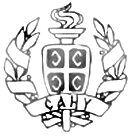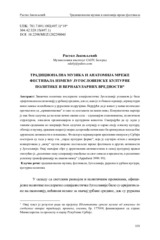Традиционална музика и анатомија мреже фестивала између југословенске културне политике и вернакуларних вредности
Traditional Music and the Anatomy of the Festival Network Between Yugoslavian Cultural Politics and Vernacular Values
| dc.contributor | Пено, Весна | |
| dc.creator | Јаковљевић, Растко | |
| dc.date.accessioned | 2018-09-14T11:19:04Z | |
| dc.date.available | 2018-09-14T11:19:04Z | |
| dc.date.issued | 2012 | |
| dc.identifier.issn | 1450-9814 (print) | |
| dc.identifier.issn | 2406-0976 (online) | |
| dc.identifier.uri | http://www.doiserbia.nb.rs/img/doi/1450-9814/2012/1450-98141200004J.pdf | |
| dc.identifier.uri | https://dais.sanu.ac.rs/123456789/3901 | |
| dc.description.abstract | Званична политика послератне социјалистичке Југославије углавном је била оријентисана на економију у урбаној средини, док се, како је то бивало и раније, агрикултури више пажње посвећивало у руралним подручјима. Верујући да је живот у њима неопходно прочистити од „примитивизма“ и тако га поставити на виши ниво, Комунистичка партија је пак била одлучна да на неки начин оживи села – едукацијом становништва, политичком структуром, локалном организацијом и културним животом. Сматрајући да су људи у таквим срединама по инерцији били одлучни да сачувају и одрже своју локалну културу, обичаје и музику, државни апарат је морао да пронађе начин како би артикулисао неподобне друштвене активности и понашање. Фолклор и вернакуларни креативни импулси у Србији постојали су тада у виду тзв. „тврде културне форме“, која је случајно и/или с намером конвертована у „меку“ путем широко постављене мреже фестивала и других активности у Југославији. Овај значајни обрт у друштвеним активностима и самој културној пракси омогућио је „релативно лаку сепарацију извођења од свог смисла и вредности, и релативно успешну трансформацију на сваком нивоу“ (Appadurai 1996: 90). | sr |
| dc.description.abstract | As official policies in the post-war Yugoslavia were oriented towards economy, mainly tied to towns, rural areas were focused on agriculture to a large extent, as it had been before. However, the Party was determined to revive villages, being of the opinion that life in those areas should be purified from “primitivism” so that it could be set to a higher level concerning issues of education, political structure, local organisation and cultural life. Since people in villages felt determined to maintain their local culture, customs and music, the State officials had to find ways to articulate uncanny social behaviours. At the time, folklore and vernacular creative impulse in Serbia was sustained as a “hard cultural form” that by accident or on purpose converted into “soft cultural form” through a wide range of festival activities in Yugoslavia. This significant turn permitted “relatively easy separation of embodied performance from meaning and value, and relatively successful transformation at each level” (Appadurai 1996: 90). The discussion of this paper intends to form a dialogue on the transformation of social structure and politics, which gradually led to severe changes in the areas of traditional musical practice. | en |
| dc.language.iso | sr | sr |
| dc.publisher | Београд : Музиколошки институт Српске академије наука и уметности | sr |
| dc.relation | info:eu-repo/grantAgreement/MESTD/Basic Research (BR or ON)/177004/RS// | sr |
| dc.rights | openAccess | sr |
| dc.rights.uri | https://creativecommons.org/licenses/by-nc-nd/4.0/ | |
| dc.source | Музикологија / Musicology | |
| dc.subject | традиционална музика | sr |
| dc.subject | фестивали | sr |
| dc.subject | Југославија | sr |
| dc.subject | рурална и урбана култура | sr |
| dc.subject | културна политика | sr |
| dc.title | Традиционална музика и анатомија мреже фестивала између југословенске културне политике и вернакуларних вредности | sr |
| dc.title | Traditional Music and the Anatomy of the Festival Network Between Yugoslavian Cultural Politics and Vernacular Values | en |
| dc.type | article | sr |
| dc.rights.license | BY-NC-ND | sr |
| dcterms.abstract | Jakovljević, Rastko; Tradicionalna muzika i anatomija mreže festivala između jugoslovenske kulturne politike i vernakularnih vrednosti; | |
| dc.citation.spage | 103 | |
| dc.citation.epage | 120 | |
| dc.citation.issue | 12 | |
| dc.identifier.doi | 10.2298/MUZ120229004J | |
| dc.type.version | publishedVersion | sr |
| dc.identifier.fulltext | https://dais.sanu.ac.rs/bitstream/id/12448/05_Jakovljevic_1450-98141200004J.pdf | |
| dc.identifier.rcub | https://hdl.handle.net/21.15107/rcub_dais_3901 |

